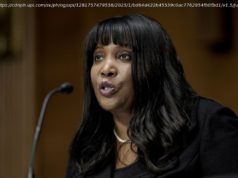The Supreme Court kicked off its new session Monday by rehearing an immigration case on which it was deadlocked last year and in which freshman Justice Neil M. Gorsuch now is poised to play a deciding role.
The Supreme Court kicked off its new session Monday by rehearing an immigration case on which it was deadlocked last year and in which freshman Justice Neil M. Gorsuch now is poised to play a deciding role.
Justice Gorsuch played an active role in oral arguments, leveling nearly two-dozen questions at the two sides as he sought to hone in on the intricacies of deportation law and how judges are supposed to grapple with crimes that make immigrants eligible for removal.
Court watchers are predicting a more active and consequential slate of cases this year compared to last year, with a full complement of nine justices on board from the beginning.
“A lot of issues lingered while the court was down,” said Josh Blackman, a professor who specializes in constitutional law at South Texas College of Law in Houston.
Monday saw oral arguments in a labor law case and then a deportation case involving James Garcia Dimaya, a permanent U. S. resident who pleaded no contest to residential burglary charges roughly a decade ago.
Homeland Security says the burglary amounted to a crime of violence, which would make Mr. Dimaya, a Philippine citizen, subject to deportation.
But the U. S. Court of Appeals for the 9th Circuit ruled that the definition of a “crime of violence” was too vague and, thus, unconstitutional.
Justice Gorsuch asked nearly two-dozen questions, suggesting he thought the judiciary had no business clearing up the law’s language. He said legislators should decide such things through hearings and expert testimony.
“If I can’t distinguish my job from a legislative committee’s work, am I not verging on the separation of powers problem?” Justice Gorsuch said.
Justice Ruth Bader Ginsburg questioned whether the crime was one of moral turpitude and how that factors into the court’s analysis, and Justice Sonia Sotomayor asked if burglary is a crime that presents a risk of physical violence by which an individual can be deported.
“The only time that I understand that burglars actually go into an occupied home is very little. It’s probably less than 10 percent in which they confront someone, probably smaller amount when they actually use force against that person,” said Justice Sotomayor.
Meanwhile, the labor case could decide whether employers can use contracts to force employees to agree to arbitration rather than join class-action lawsuits.
Justice Gorsuch was quiet throughout, but other justices focused on whether workers’ rights are adequately protected if they’re unable to challenge their employers collectively.
Justice Stephen G. Breyer said he’s worried that employers want to overturn statutes that date back to the 1930s and expressly protect workers’ rights to band together in administrative and judicial actions.
“I haven’t seen a way that you can, in fact, win the case, which you certainly want to do, without undermining and changing radically what has gone back to the New Deal,” Justice Breyer said.






